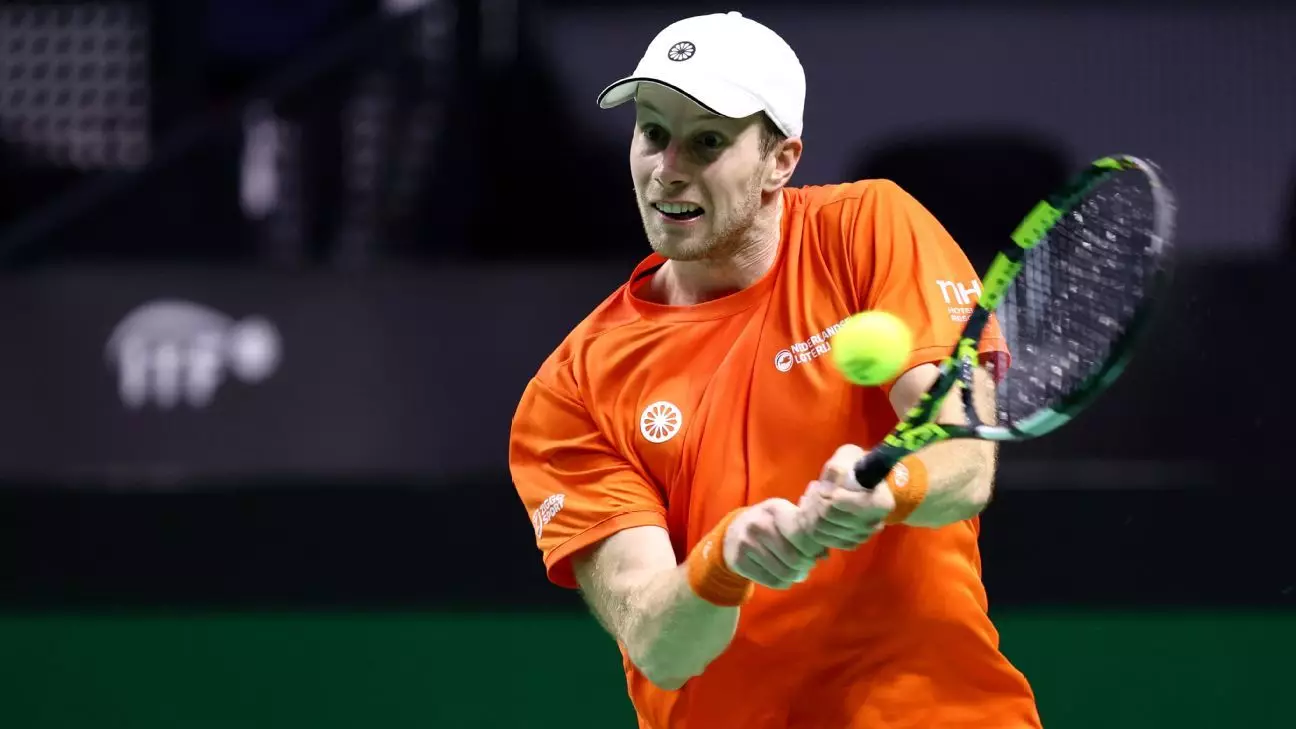In a stunning turn of events at the Davis Cup semifinals held in Malaga, Spain, the Dutch tennis team has etched its name in history by advancing to its first final. Their success was propelled by two remarkable performances, the highlight being Botic van de Zandschulp’s gritty match against Daniel Altmaier, which ended in a 6-4, 6-7 (12), 6-3 victory. The win comes after van de Zandschulp’s previous triumph over the legendary Rafael Nadal, a feat that adds considerable weight to this surprising run. The atmosphere in the Palacio de Deportes Jose Maria Martina Carpena was electric yet melancholic, as it signified not only the rise of a new contender but also the end of an era with Nadal’s impending retirement from professional tennis.
Dutch captain Paul Haarhuis emphasized the collective effort over individual ranking as the cornerstone of their success. Without a top-ranked player in their lineup, Haarhuis noted, “We don’t have that top-five player. We don’t have that top-10 player. We don’t have that top-15 player.” Yet, the team’s synergy and mutual belief culminated in an achievement that surpasses mere individual accolades. Each player brought something unique to the court, resonating with the notion that teamwork can triumph over individual brilliance. This perspective is increasingly relevant in a sport often dominated by singular stars.
Tallon Griekspoor’s decisive victory against Jan-Lennard Struff further solidified the Dutch team’s dominance, leading to a clean sweep against Germany. Griekspoor’s exceptional performance, highlighted by an impressive 25 aces, showcased not just skill but relentless determination. His celebratory drop to his knees after the last point echoed a sentiment that the team has harbored for years—a belief that their moment would eventually come. “To do it now feels unbelievable,” he expressed, capturing the essence of their hard-fought journey to the final.
In a tournament that often sees powerhouse nations dominate, the Netherlands’ victory serves as a reminder of the unpredictable nature of sports. The inability to pinpoint a favorite based on rankings alone adds to the intrigue of tennis, giving rise to budding talent capable of defying expectations.
The Echoes of Nadal’s Shadow
While the excitement of the Dutch victory was palpable, the shadow of Rafael Nadal’s legacy loomed large, particularly given that this tournament holds significant meaning for the 38-year-old Spanish icon. Having announced that the Davis Cup would mark his retirement, numerous empty seats in the arena bore testament to the expectations set before the tournament, a reminder of Nadal’s formidable presence in the sport. Fans who had aspired to witness the veteran compete were instead met with anticipation for a new generation of talent stepping up to fill the vacuum he leaves behind.
The significance of the match against Altmaier was not lost on Van de Zandschulp, who reflected on the psychological weight of competing after having recently defeated a legendary figure like Nadal. “At some point, I didn’t know what to do anymore on the match points,” Van de Zandschulp said, acknowledging the emotional toll of high-stakes tennis. Such confessions illuminate the mental resilience required of athletes, especially when navigating pressures associated with growing expectations.
The road to the final wasn’t smooth sailing for the Dutch players. Facing pressure-packed moments during crucial points, the ability to maintain composure proved vital. Van de Zandschulp’s match against Altmaier was marked by a series of intense exchanges, where his resilience came to the forefront. Digging deep to fend off multiple match points exemplified the spirit within the team—one that has been fostered over years of relentless training and shared ambition.
As they turn their gaze toward the final, the Netherlands will carry a story that extends beyond mere statistical achievements. Their journey signifies a larger narrative in the sport: new faces stepping into the limelight and the evolution of tennis itself. With no clear frontrunners based on prior successes, this final promises to thrill fans worldwide, embodying the very spirit of competition that makes the Davis Cup a cherished event.
In a sport defined by triumphs and tragedies, the rise of the Netherlands signifies not an end, but the beginning of an exciting chapter in international tennis.


Leave a Reply